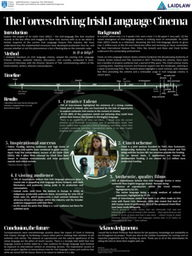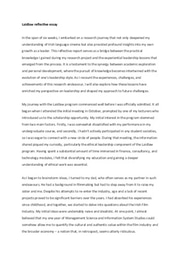Summer 1 Blog Post
Sadbh McCannon
2023 cohort, Trinity College Dublin
Management Science and Information Systems Studies
Laidlaw Summer 1 Blog Post:
Networking Nerves and Cinematic Curves: Surviving Summer 1
Prologue: Honesty first - My outset with the Laidlaw programme was far from a fairy-tale beginning. I was plagued by self-doubt – unsure of whether I was smart enough or passionate enough to even apply. My initial ideas were idealistic to the point of naivety. At one stage, I entertained the ambitious task of measuring the cultural significance and authenticity of the Irish Film industry... The specifics of that plan? Still a bit hazy, honestly.
I abandoned the task of applying not once, but twice, deciding I wasn’t capable. Seeking clarity, I reached out to a creative industries consultant from London following her consultancy publishing an interesting report, and had a discussion over Zoom. After meetings with four potential mentors, I finally clicked with both a project and a supervisor that fit. The Laidlaw application was submitted a few minutes before the deadline, following a frenzied all-nighter. Admittedly, it wasn't the pinnacle of ethical practice.
Project: I spent the first week of my research in Trinity library, reading myself around in circles. Looking back, my project, titled ‘The Forces Driving Irish Language Cinema’, exists in a niche with scarce scholarly work. My research leans less on existing literature and more on my primary findings. In those early days I also cornered (nicely) a lovely lady who plays a very active role in the Irish Film industry and was more than happy to put me in touch with some potential interviewees. The snowball sampling began.
I soon came down with an earth-shattering chest infection that rendered me bedridden with both excruciating Laidlaw guilt and with the lesser painful physical illness. This delayed me by a number of weeks. Confined to my bed, I found an opportunity to immerse myself in almost every Irish language feature film ever produced, turning my sickbed into an unconventional research station.
I finally recovered, but I was now being ghosted by research ethics officials. I won’t bore you with the exact delays, mistakes and confusions that took place, but weeks were definitely taken off my life and added onto my project timeline as a result.
Throughout this journey, I couldn't shake my impostor syndrome. My fellow scholars were oozing passion for their fields, my ALS partners were making serious headway with their projects, and I was lagging behind. Laidlaw has reiterated to me the realisation that even the state of being the least accomplished person in the room can be an accomplishment, and there is great comfort in that.
I eventually got back on track. I finalised ethics documents and received official approval. I prepared semi-structured interview questions and I worked my way up to my two weeks of interviews. One notable event, was the TG4 program launch day that I attended in Temple Bar. The objective was ambitious: to meet the television network's Director General and secure interviews with him and his commissioning editors. That day was admittedly extremely nerve-wracking. I navigated the event (that I was only semi-invited to) with a strategic blend of Laidlaw networking learnings and smiles, it is a miracle that I escaped the photo below. Thankfully, come the end of the day, I had made contact, explained my endeavour and onboarded interviewees.
The launch of TG4's autumn schedule. Photograph: Gareth Chaney/Collins Photos
The fortnight of interviews was intense but also extremely fulfilling and gave me a lot of insight. I spoke with writers, directors, producers, commissioners, curators and more. I learned about adjusting my communication style to suit different people and I ensured I was really listening while also knowing what to say next! I worked hard to unveil biases as they came up, as well as to allow a natural flow of conversation. I wasn’t perfect at it, but I gave it everything I had.
The results of my research were somewhat surprisingly, overwhelmingly positive. The absence of coproduction in Irish language production and the cultural significance of the native language were highlighted as key factors in its recent success. Exposure to international content on streaming services is also bringing in a new audience for foreign language works, enriching Irish language cinema.
Summer 1 was not plain-sailing, and I am sorry to my coordinators for my subsequently late submission… but I am delighted to say that I learned the importance of seeking help, being flexible and embracing imperfection. The self-doubt has not totally subsided, but I believe wholeheartedly in the relevance and the validity of the research that I carried out. I’m grateful to everyone behind the Laidlaw programme for making that a possibility.


Please sign in
If you are a registered user on Laidlaw Scholars Network, please sign in